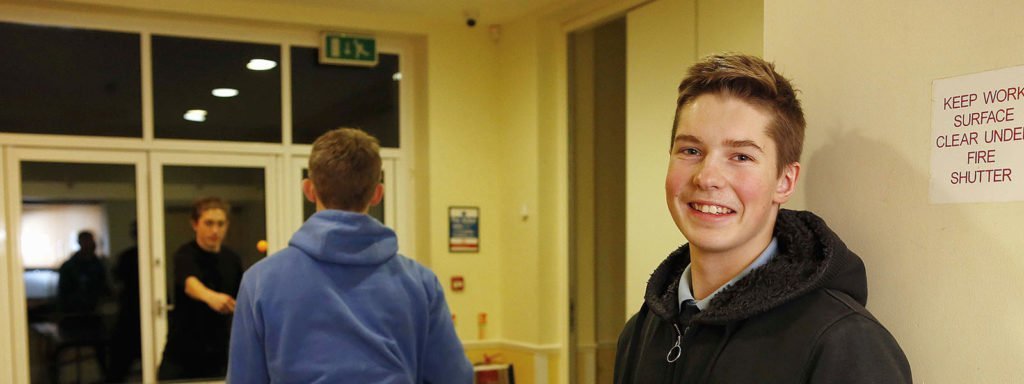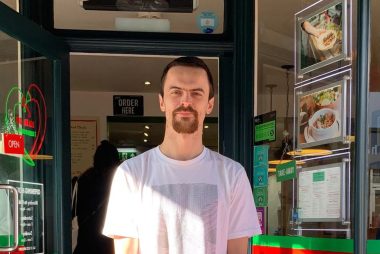With exams looming Andre was getting into trouble at school. Counselling sessions with YMCA DownsLink Group’s, YMCA Dialogue counselling service, enabled him to face up to his fears and develop plans for the future.
Andre, 15, was referred to YMCA Dialogue counselling by his school’s Deputy Head. There were a number of incidents involving fighting and rudeness to teachers. The Deputy Head spoke with Andre’s mother who was already concerned about Andre’s increasing outbursts of temper at home.
Initially Andre was reluctant to attend counselling, claiming his parents wanted him to come to give up smoking cannabis. The YMCA Dialogue counsellor made it clear that counselling was optional and Andre didn’t have to come and that he could choose what he wanted to talk about.
Recognising that discussions around smoking cannabis had led to arguments elsewhere, the counsellor negotiated with Andre. They agreed that if smoking cannabis was discussed they would both be adult in the way they spoke about it. This meant looking at the facts, being clear if they were expressing an opinion, and being open to hearing things they may not agree on.
Andre chose to talk about smoking cannabis. He spoke about how much he enjoyed it and why; the way it bonded him with his friends. The counsellor showed she understood how much he valued his friends. She noticed that Andre felt smoking cannabis helped them forget about things.
The counsellor gave Andre some key facts on cannabis. Andre was genuinely shocked to read some studies exploring the way it might adversely affect teenage brain development and he gained more understanding on why there are lots of mixed messages about whether cannabis is a safe drug or not.
Counselling gave Andre a neutral space in which to think through how he was using cannabis. He spoke about his smoking as recreational with his friends. He identified that he liked it when he felt close to his friends and could relax and forget about his problems. With the counsellor’s help he also began to notice the controls which stopped him smoking. These included if he had to come to school, he had arranged to do something with his girlfriend or there was a family occasion.
Gradually the discussions about smoking cannabis fizzled out. Then with some difficulty Andre began to talk about the things he had never voiced before. Arguing with people and smoking cannabis usefully took up much of his time and blocked out other worries. He felt he wasn’t very bright and wouldn’t do well in English and Maths. As he didn’t know how to move forward or think about what would happen after school the future looked bleak. He had been so rude to his teachers he felt embarrassed to ask for help so he continued to be angry with them, berating them for not helping him. And being stuck in the loop of arguing about cannabis with his mother, he felt she wasn’t helping him work it out either. Overall Andre felt very angry and let down by people.
The counsellor helped Andre reconsider his anger – to think of it in terms of levels of anxiety he was feeling. Andre struggled with the idea that as a boy it was OK for him to feel anxious about things. Yet counselling offered a safe, confidential and respectful place in which Andre was able to explore the connection between his anxiety and anger. He came to recognise that he wasn’t allowing others to help him as he scared them off with his anger.
Andre rehearsed how he would ask for help to apply for courses and identified who he felt most comfortable to approach in the school. He began to reflect on what he was good at; he was very sociable, people liked him, he was a very capable communicator with adults and he was very presentable.
As the exams approached Andre learned he was being offered a college place. The counsellor was able to talk with him about his expectations of college and to visualise his future. Andre wanted to succeed and one day be self-employed but he felt he couldn’t do English and Maths. Despite continuing to believe he would fail these exams Andre said he was going to go through with them to see what he could do. He planned to follow this up with further study when he got to college.
With exams imminent the counsellor took the opportunity to review what Andre had got out of the sessions. Andre fed back that he had valued counselling, he appreciated having the time to talk about himself. He felt more in control and he was proud of himself for committing to attending his exams.
Being able to spend time talking about the important things, and the very important things, was key to helping Andre move forward in a more positive way. Many young men find it impossible to acknowledge their fear of failure. Once Andre had done this he was able to see that there were options open to him even if he failed. And alongside this he was able to reflect on his strengths, and develop a positive plan for the future.
Many schools and colleges have YMCA Dialogue counsellors on site. Find out more here.
*Name and photo have been changed to protect the identity of the young person




